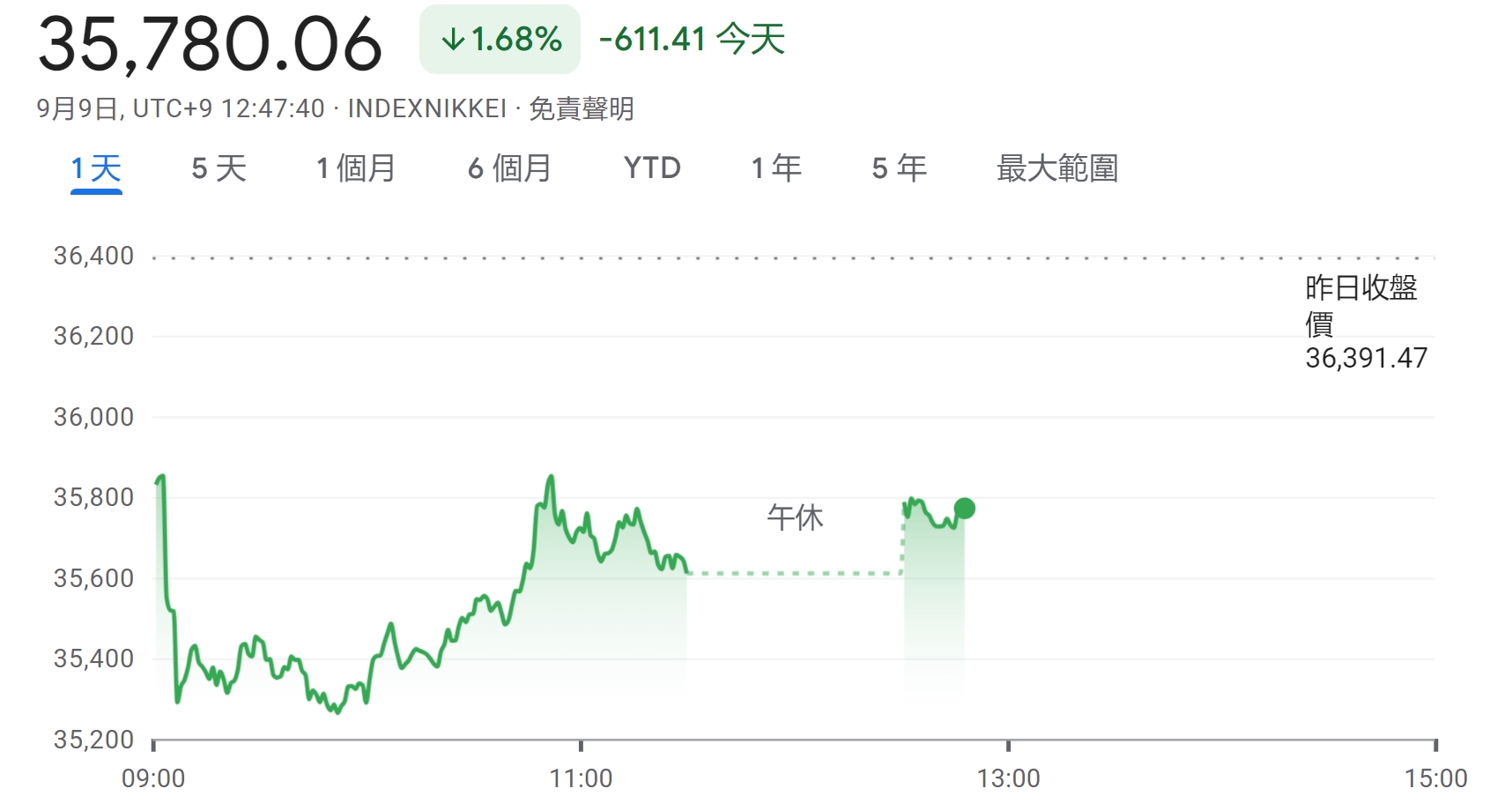Data released by the U.S. Department of Labor on Friday showed that non-farm payroll employment increased by only 142,000 in August, far lower than the 161,000 economists expected. Although the unemployment rate fell slightly to 4.2%, in line with expectations, the employment growth rate The weakness still aroused market concerns about the U.S. economic outlook, causing U.S. stocks to plummet last Friday.
Affected by the slump in U.S. stocks, coupled with Japan's revised data released on Monday, Japan's second-quarter GDP increased by 2.9% annually, which was significantly lower than market expectations of 3.2% and lower than the initial estimate of 3.1% annual growth, leading to market uncertainty. Concerns about the weakening of Japan's economy have increased. Japanese stocks fell sharply after the opening on Monday. The Nikkei 225 index once fell by more than 3%, reaching a low of 35247.87, a miserable drop of 1144 points.
Before the deadline, the Nikkei 225 Index had rebounded and currently fell 611.41 points to 35,780 points in a single day, a decrease of 1.68%.

U.S. non-farm payroll data triggers market panic
Yutaka Miura, senior technical analyst at Mizuho Securities, said that Japanese stock markets are determined by the U.S. stock market and currency, and after the U.S. released the latest non-farm payroll data, optimism that the economy was not so bad has faded.
Shoji Hirakawa, chief global strategist at Tokai Tokyo Intelligence Laboratory , said that global investors may be avoiding risks and cashing out, including Japanese assets. Based on the U.S. non-farm payrolls data in August, investors may have decided to react to the U.S. economic recession and the Federal Reserve. Concerns about the possibility of significant interest rate cuts cannot be ignored.
Today's scene also happened in early August. Due to the Bank of Japan's interest rate hike in July and the weak US non-farm payrolls data in July, Japanese stocks plummeted on August 5, with the Nikkei 225 Index and Topix Index recording their largest declines since 1987. , although Japanese stocks have rebounded since then, they are still 11% lower than the historical high hit in July. If Japanese stocks once again stage Black Monday, the future trend may be unpredictable.
Due to the Bank of Japan raising interest rates in July and market expectations that the Federal Reserve will cut interest rates to support the U.S. economy, the yen has been rising recently. The current exchange rate of yen against the US dollar is 142.59 yen per US dollar, which is close to a one-month high. point.
Japan may still accelerate interest rate hikes
Although Japan's second-quarter GDP data was lower than expected, casting a shadow on the Bank of Japan's interest rate hike plan, SMBC Trust Bank senior analyst Masahiro Yamaguchi pointed out that Japan's economic growth is still strong enough for the Bank of Japan to maintain its interest rate hike path:
While the revised GDP data slightly lowers the assessment, it is unlikely to have a big impact on the stock market and it will not change the direction of Japan's economy.
Tsutomu Watanabe, a former official of the Bank of Japan and professor of economics at the University of Tokyo, recently said that the Bank of Japan may raise interest rates faster than everyone expects, and there may be two more interest rate hikes this year. He believes that the Bank of Japan should work hard to convey Its determination to raise interest rates ensures that the market will not panic if interest rates rise faster than many expect.
As Japan's top inflation expert, Tsutomu Watanabe believes that the reasons for the Bank of Japan's interest rate hike announced in July were inconsistent with the price trends at the time, indicating that the Japanese authorities intend to raise interest rates to create a buffer against a potential economic recession and normalize monetary policy as soon as possible. It is not unfounded for the central bank to raise interest rates to make room for economic shocks, but the Bank of Japan should make this intention clear.








